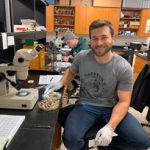We were excited to partner with the Michigan State University Department of Fisheries and Wildlife to host a series of webinars on lake and stream topics. Organized and presented by fisheries and wildlife graduate students, these webinars were free to attend and open to all. Each webinar was recorded and posted below.
Nice Mussels! The importance of freshwater mussels in lake and river ecosystems.
 February 28, 3:00 PM. Mussels are the hidden gems of freshwater ecosystems. Unlike other organisms that can be easily seen and identified, mussels take the back seat when it comes to popularity and conservation, with nearly 70% of North American freshwater mussels being imperiled. But don’t overlook them, these ecosystem engineers are key to the health of freshwater systems. Not only do they serve as a food source, they filter the water, and provide substrate for other organisms. Presented by Danielle Matuszak.
February 28, 3:00 PM. Mussels are the hidden gems of freshwater ecosystems. Unlike other organisms that can be easily seen and identified, mussels take the back seat when it comes to popularity and conservation, with nearly 70% of North American freshwater mussels being imperiled. But don’t overlook them, these ecosystem engineers are key to the health of freshwater systems. Not only do they serve as a food source, they filter the water, and provide substrate for other organisms. Presented by Danielle Matuszak.
Stream Ecosystems: how they work, how humans have changed them, and how we can restore them
 March 7, 3:00 PM. This webinar will first describe the general way water flows over land and how this creates riverine habitats for invertebrates and fish. It will also review the common ways humans change riverine environments and alter the natural habitat. Additionally, a brief overview will be given of relevant legislation that impacts how rivers are managed in Michigan. Lastly, examples will be presented of how humans can attempt to restore habitat to altered riverine ecosystems. Presented by Janice Albers.
March 7, 3:00 PM. This webinar will first describe the general way water flows over land and how this creates riverine habitats for invertebrates and fish. It will also review the common ways humans change riverine environments and alter the natural habitat. Additionally, a brief overview will be given of relevant legislation that impacts how rivers are managed in Michigan. Lastly, examples will be presented of how humans can attempt to restore habitat to altered riverine ecosystems. Presented by Janice Albers.
Aquatic food webs: How do fish decide what to eat? And why?
 March 14, 3:00 PM. The major goals for fish can be quite simple: Survive, grow, and reproduce. However, to survive and reproduce, fish must eat & thanks to our existing knowledge of food webs, we can address how fish choose what to eat and where to find food when the dinner bell rings. Here, I will discuss the concept of aquatic food webs as it pertains to the work that I am doing on salmonine and walleye feeding behavior in Lakes Michigan and Huron. We will look at how humans may influence aquatic food webs and at the role that invasive species may play in food webs that have already been established. These same concepts and processes can be applied to inland lakes and streams, and we will investigate how food webs may vary from lake to lake as well as between lakes and streams. Presented by Jake Sawecki.
March 14, 3:00 PM. The major goals for fish can be quite simple: Survive, grow, and reproduce. However, to survive and reproduce, fish must eat & thanks to our existing knowledge of food webs, we can address how fish choose what to eat and where to find food when the dinner bell rings. Here, I will discuss the concept of aquatic food webs as it pertains to the work that I am doing on salmonine and walleye feeding behavior in Lakes Michigan and Huron. We will look at how humans may influence aquatic food webs and at the role that invasive species may play in food webs that have already been established. These same concepts and processes can be applied to inland lakes and streams, and we will investigate how food webs may vary from lake to lake as well as between lakes and streams. Presented by Jake Sawecki.





